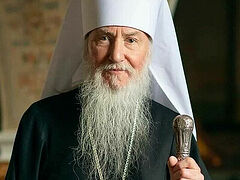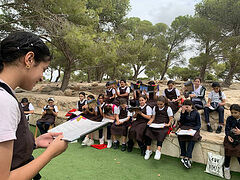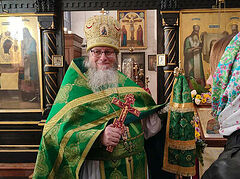Metropolitan Mark (Arndt) of Berlin and Germany, Vice President of the Synod of Bishops of the Russian Church Abroad (ROCOR), has recently visited the ROCOR’s Ecclesiastical mission in Jerusalem. While there, Vladyka found time to discuss what he saw in the Holy Land now, and how the mission lives. Likewise important, he shared what he learned from the ascetics who labored ascetically there, and talked about what all of us have to do in order to keep the Holy Land inside ourselves.
—Vladyka, what did you see in the Holy Land, and specifically in our ecclesiastical mission now? How does the mission live in the current very difficult situation?
The present circumstances, that is, the war, are naturally wholly reflected in our life, and the first result we feel is that we have no pilgrims whatsoever. Everybody is afraid of coming here because of the military activities.
Of course, there is a certain amount of skepticism about it, because basically, the war does not affect us. We are located in Jerusalem and its surrounding areas, and I was even able to take a trip during the afterfeast of the Baptism of the Lord. We went to Galilee, where the Israelis are also at war with Hezbollah, and we did not feel any military activities per se.
However, the results of the war are felt everywhere. There were no pilgrims at all. We had the whole Jordan River to ourselves, we could pray as long as we wanted without any problems, because there were no people there—which is unusual in other times.
I saw the same picture in Jerusalem as well—everything is empty. The streets are empty. Places where people are usually selling and buying goods are empty, all the stores are closed because there are no customers there. Things now are worse than it was during the COVID-19 pandemic.
So, on the one hand, we are glad that we can do what want, to pray and visit Holy sites, but on the other hand we are sorry for the people who suffer from this. We met with the Patriarch of Jerusalem, Theophilos III, and he told us that many people are simply starving because the head of the family has no job and cannot bring home money. They have nothing to eat.
—How are the mission and its members surviving now? How does the current situation affect them?
The nuns and monks have some money in banks, but these resources are depleting. We have no pilgrims, no one brings money to help. Of course, the Russian Church Abroad sends money in order to help the mission, but the funds that the Russian diaspora has are limited as well.
—What can we do, all of us, to support our mission?
We can save or gather some money and send it here. The mission needs our material support.
—Vladyka, you mentioned the meeting with the Patriarch of Jerusalem. What did you discuss with him? What was the atmosphere of the meeting?
The atmosphere was very warm, as always. We are really good friends, and I regularly see him whenever I come here. Every Orthodox bishop who comes to visit the Holy Land must receive a blessing from the Patriarch of Jerusalem.
We naturally talked about all our common issues. Members of our churches have great problems because the general atmosphere in Israel is very difficult. We are being pressed by the local authorities. You may find many more Palestinian Christians in California, for example, than here. Our Christian parishes are dwindling because of the pressure from outside, so the number of Christians is diminishing by the day.
Our girls’ school, for example, which we organized in the 1930s, originally had only Christian children. Now, there are only eight Christians out of 428 students there, all the others are Muslims. We are under daily pressure from both sides, from the Israelis and the Palestinians. Christians have a very difficult life here.
We also discussed the situation in Ukraine. We, as members of the Russian church, are extremely grateful to the Patriarch of Jerusalem for supporting the true and canonical Ukrainian Orthodox Church, and not those who have almost nothing to do with Orthodoxy—the gang that has been established by the Patriarch of Constantinople against the will of the people.
It is very important that the Patriarch of Jerusalem supports us in this regard.
—Despite the Holy Land being the Holy Land, many clergymen do not want to serve there because of huge crowds of tourists. Now, because of the war, this is not the case, of course. But do you agree with that attitude in general? Is it based on truth? And if so, is it a problem? How is it possible to solve it?
Yes (laughs). This is a two-fold problem. On the one hand, tourists and pilgrims who come here bring in money and support the mission. On the other hand, they are crowding our Holy sites, and many priests in our church are afraid of coming here because they do not understand how to serve here.
In fact, we see no problem with this because the pilgrims who come here usually have confessions with their own priests, so they do not need to be confessed by our local fathers. So, the main challenge for our priests is to serve daily. In summer, for example, this is difficult because it is very hot here. Not now, of course, but it will be hot in a month or so, and this is reflected in our life.
—Can you tell us a little bit about the churches and monasteries you are spiritually caring for in the Holy Land? Why they are so special for all of us?
Our mission was established in the nineteenth century, because there were thousands of Russian pilgrims coming to the Holy Land, and they needed to be helped by people who understood what they were doing, who understood where they were, that this is the land where our Lord Himself walked, and this is felt in every step we take.
Therefore, Russian pilgrims came to the Holy Land from the very beginning, from the early centuries of Christianity in Russia. There was always a Russian presence here, and it became so large in the nineteenth century that people needed help. Thus, the mission was established in order to give guidance to our pilgrims.
From the beginning of the Bolshevik revolution, the influx of pilgrims practically stopped, and it was extremely difficult for members of our mission to feed themselves. The enormous assistance that they were receiving from Tsarist Russia was completely gone. So, people here had nothing to eat.
During World War II, our nuns went out of the convents to work on street construction. They left the convents each morning with mental prayer, and returned in the evening, completely exhausted, trying to have a snack and get some sleep. That was all they could do.
After World War II, the influx of pilgrims was very, very slow. Of the Russian faithful, only immigrants were able to travel, because it was impossible to come from the Soviet Union. Only then did the presence of Russian monks and nuns in the Holy Land gradually grow. Now, in recent years, this growth has been steady. Very many pilgrims have been coming here, particularly from Russia and Ukraine. And now, it is gone again.
So, it is possible to say that we are subject to the constantly changing moods of the governments of those concerned. We are currently allowed to come, but this is harder for our pilgrims from Russia and Ukraine.
—Why are our convents and churches in the Holy Land so important for all of us?
They are personally linked to the life of our Savior Jesus Christ and His Apostles. The whole history of the Church is linked to this land, so we are fortunate that besides the Greeks, only the Russian Church has the premises here. No other Church has premises that are continually staffed. We are here to talk directly to the pilgrims about the history of this country.
—I know that your spiritual roots are, first and foremost, in the Holy Mountain of Athos. But I certainly you have met many ascetics in the Holy Land. Can you tell us a little bit about them? What have you learned from them?
I should write a book about them! I cannot talk about them in just a few minutes, it is simply impossible.
Let’s try to start writing this book now.
The Russian church has produced many great people in this outpost. St. Theophan the Recluse was here as a priest when he served in the Russian mission. So, we have many people who have done an extraordinary job of showing Orthodoxy to people who were not yet Christians.
For example, we, as the Russian Church, were the only ones who set up schools for girls in this country. The local population, the British and French, gave them no serious care. So, we were the first and the only ones who ever established schools here. One of them is operating to this day, in Bethany, and even members of the Palestinian government visit it because their daughters and grandchildren study there. This is a great help to our nuns, who have been very active here.
—What did you personally learn from the ascetics who lived in the Holy Land?
Prayer. This is the most important thing. How to pray under difficult circumstances, under circumstances that are different from those that we have in our own countries in Europe or in America. People have to suffer very much, including from the great heat during the day and the great cold at night. Here you will find people who are, let’s say, great experts in prayer, and particularly in the Jesus prayer. We have real examples of Christian life here. These people have been taking care of our spiritual needs for centuries now, and it this very important.
The head of our mission, Father Roman Krassovsky, has formed a small group of people who interview those who have been living here. For example, they interviewed Abbess Moisea (Bubnova), who reposed in the Lord in 2021, and others who were able to talk about their lives. This is very instructive.
—What do we need in these times of uncertainty to grow at least a small piece of the Holy Land inside ourselves, in our hearts and souls?
Pray! First of all, pray. Pray and fast.





